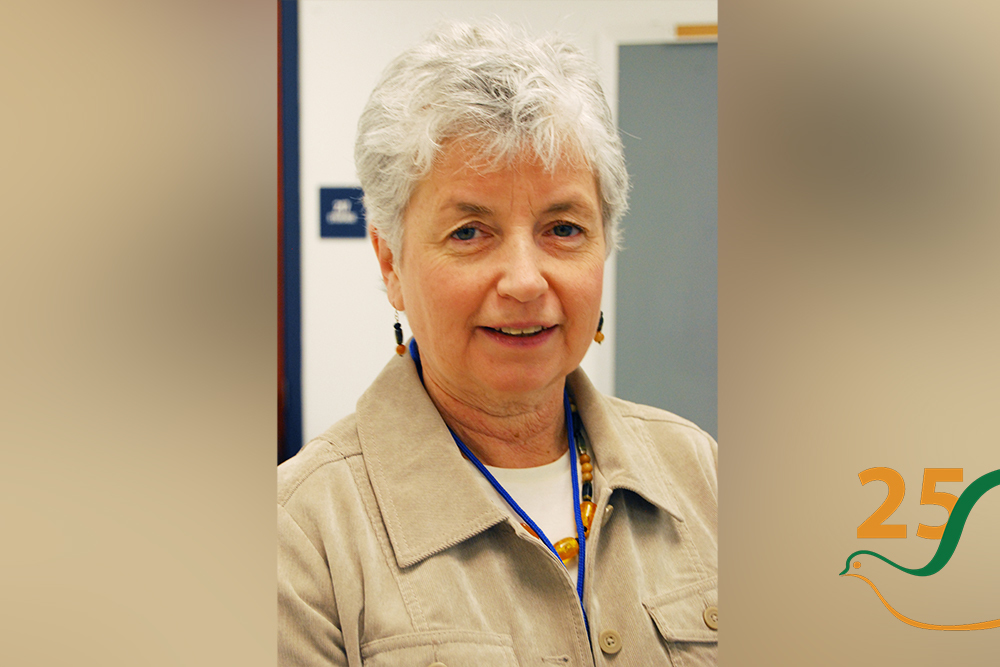During the 2019-20 academic year, as the Center for Justice and Peacebuilding commemorates its 25th anniversary, a series of guest authors will share reflections about CJP’s personal impact. We want to hear your thoughts, too! Thousands of people have intersected with CJP over the years, and each of you has contributed to the work of making the world more just and more peaceful. Join us for our anniversary celebration June 5-7, 2020. Visit the anniversary website for more details.
Read reflections by Phoebe Kilby, Mohammad Abu-Nimer, Maryam Sheikh, Sanjay Pulipaka, Howard Zehr and Ruth Zimmerman, and Shyamika Jayasundara-Smits.
***
The threatening invasion of Iraq by the U.S. sent me seeking CJP. Clearly the many peace marches I had participated in in Washington were not effective. I thought at the time that CJP could teach me about peacebuilding and how to stop such war mongering by my country. But what I learned instead equipped me to confront a more personal issue — that I and my family were offenders in an insidious history of injustice carried out within the United States since its founding. CJP gave me many tools to address those injustices, though the journey continues.
Taking classes with my international classmates was fascinating and humbling. I learned about conflicts all over the world and how people were working to transform them. Jayne Docherty gave me the tools for conflict analysis. John Paul Lederach taught me the importance of “mercy, truth, justice and peace” (Psalm 85:10) for conflict transformation. I explored identity with Barry Hart, the importance of ritual and symbol in peacebuilding with Lisa Schirch, restorative justice with Howard Zehr, and Strategies for Trauma Awareness and Resilience (STAR) with Carolyn Yoder. Mostly I thought about the use of these concepts and skills to address conflicts and injustices in other countries or in the US where those conflicts and injustices were caused by other people – not by me, not by my family.
A few years after I graduated, I learned that CJP was exploring a new program called Coming to the Table. The people coming together were descendants of enslavers and persons enslaved in the United States. They were talking about racial healing and reconciliation. That got me thinking. My father’s family had a long history in Virginia. Had they been enslavers? It did not take much research for me to learn that indeed they were. I knew that there were African American Kilbys living in Virginia. A Google search brought up the name Betty Kilby Fisher, who had written a book titled Wit, Will and Walls (Cultural Innovations, Inc., 2002). When I read the book, I suspected that my family had once enslaved hers. Her father and mine had grown up on farms less than a mile apart.
But what should I do with this information? I consulted with CTTT co-founder Will Hairston, who told me that I should contact Betty. Now that was a scary thought. But my CJP experiences gave me the courage to try. If my classmates from Israel, Palestine and Lebanon could talk to each other, then I should be able to do this. On Martin Luther King Day 2007, I sent Betty an email. She responded, “Hello Cousin.”
Since then, we have participated in CTTT together and learned more about our families. Historical records confirm that my family enslaved hers; DNA analysis shows we really are cousins. I have seen Betty show me mercy as we share the difficult truth of our families’ relationship and seek peace together. I have tried to make amends for the injustice of my family and my own treatment of African Americans through the establishment of a college scholarship endowment for Betty’s family. John Paul Lederach’s “mercy, truth, justice and peace” inspired this work as did Howard Zehr’s concepts of restorative justice. I watched as rituals used in STAR helped my cousin Betty face the many traumas she experienced when she and her brothers desegregated their high school. I learned that my own identity is linked to whiteness and privilege.
It may sound as though I have figured this all out, but the journey continues as I learn from Betty and our family and together we strive for that balance between peace and justice that CJP teaches us to seek.
Phoebe Kilby retired in 2014 having worked for eight years as associate director of development for Eastern Mennonite University’s Center for Justice and Peacebuilding, where she also earned a graduate certificate in conflict transformation. Coming to the Table, a national racial reconciliation organization, was initially sponsored by CJP and was an affiliate organization from 2012 until recently (the organization is now sponsored by Restorative Justice for Oakland Youth in California). A past CTTT president, Phoebe is a member of the organization’s Reparations Working Group and co-facilitates a local group in Asheville, North Carolina.
She and her African American cousin, Betty Kilby Fisher Baldwin, published their story in a book of CTTT stories, Slavery’s Descendants (Rutgers University Press, 2019), and were featured the month after the book was released in a BBC News segment.
In addition to her grad certificate, Phoebe holds a BS in botany and Master of Environmental Management degree, both from Duke University.
To share comments or connect with Phoebe, use the comment box below.
